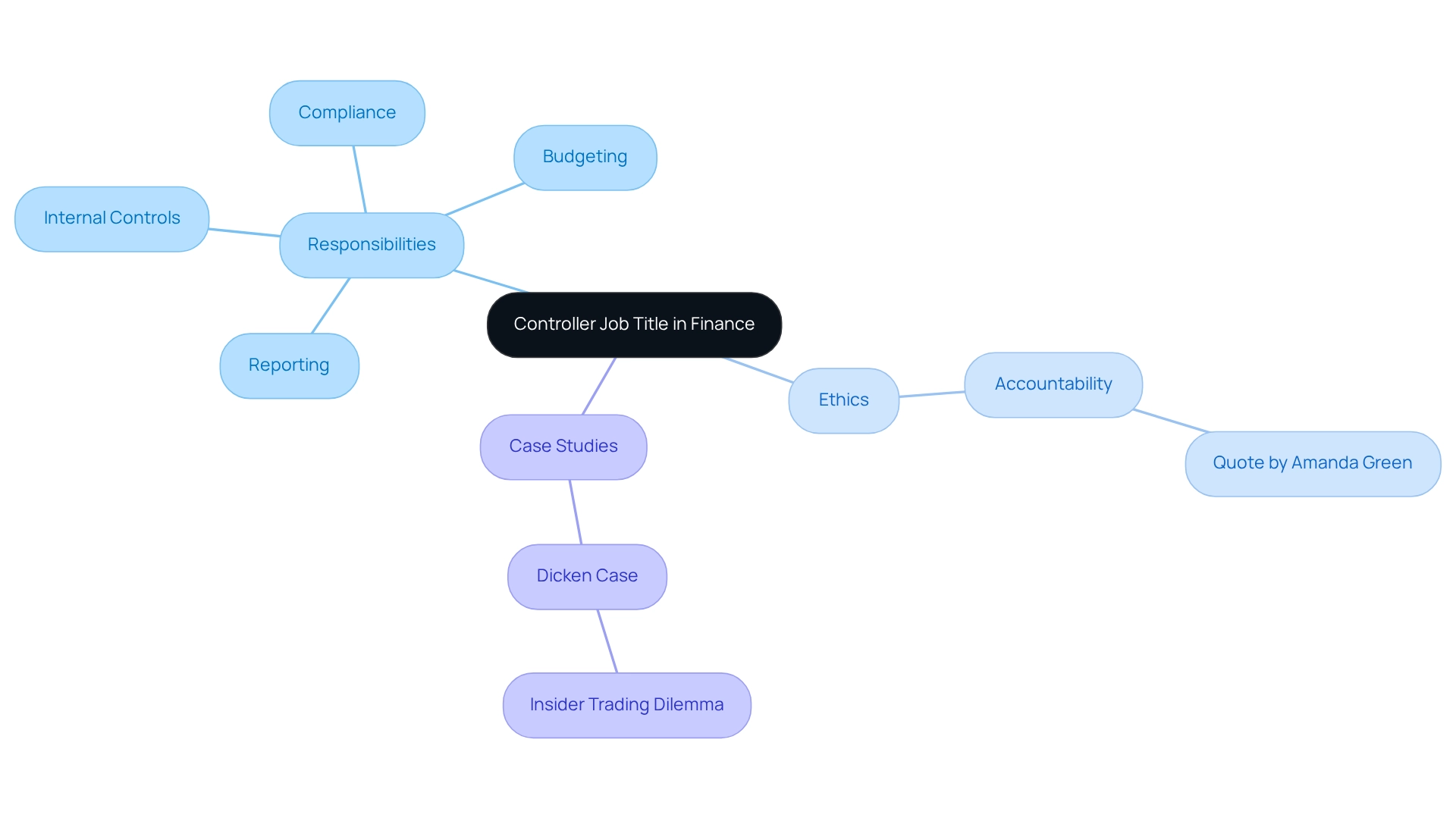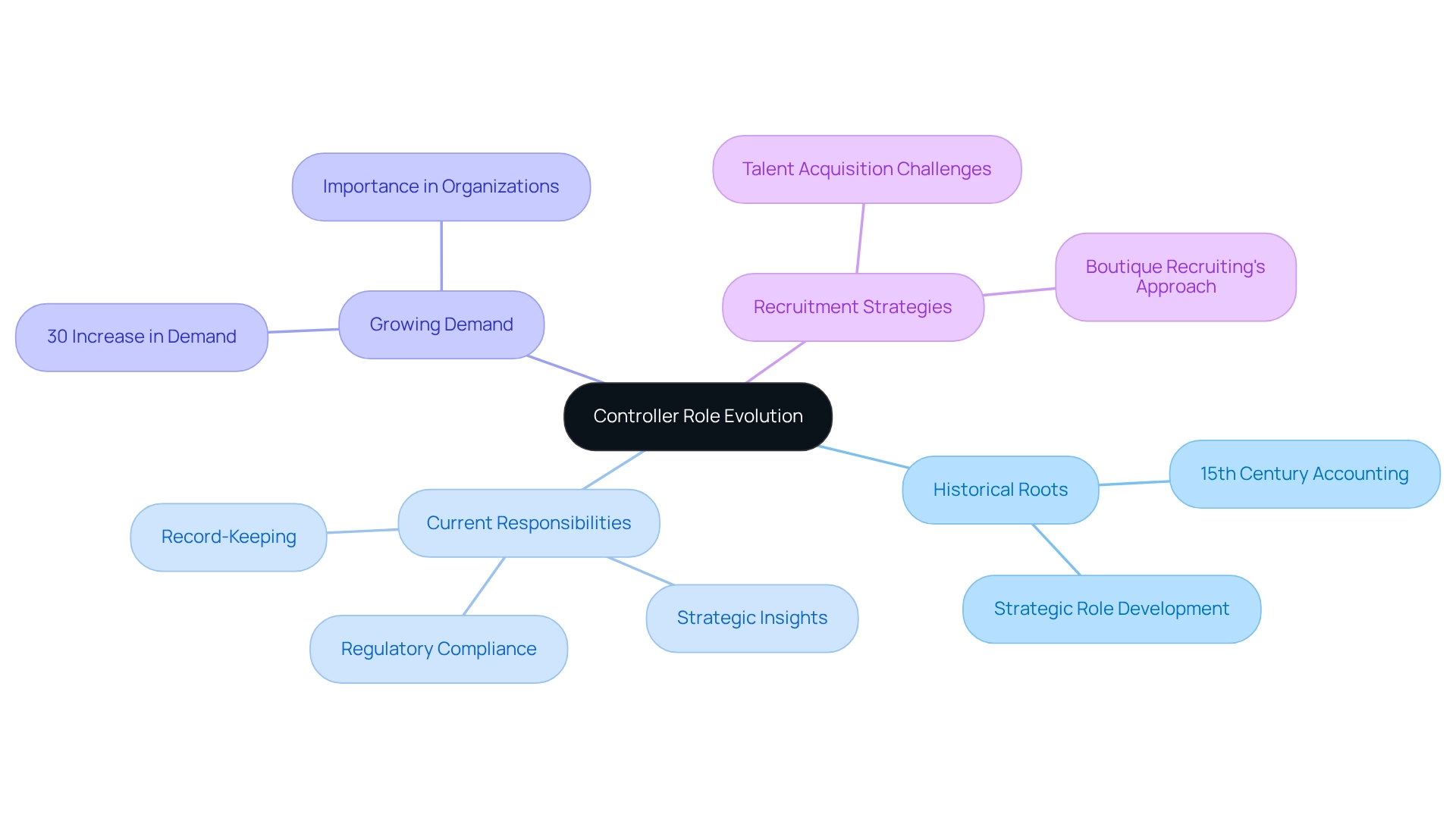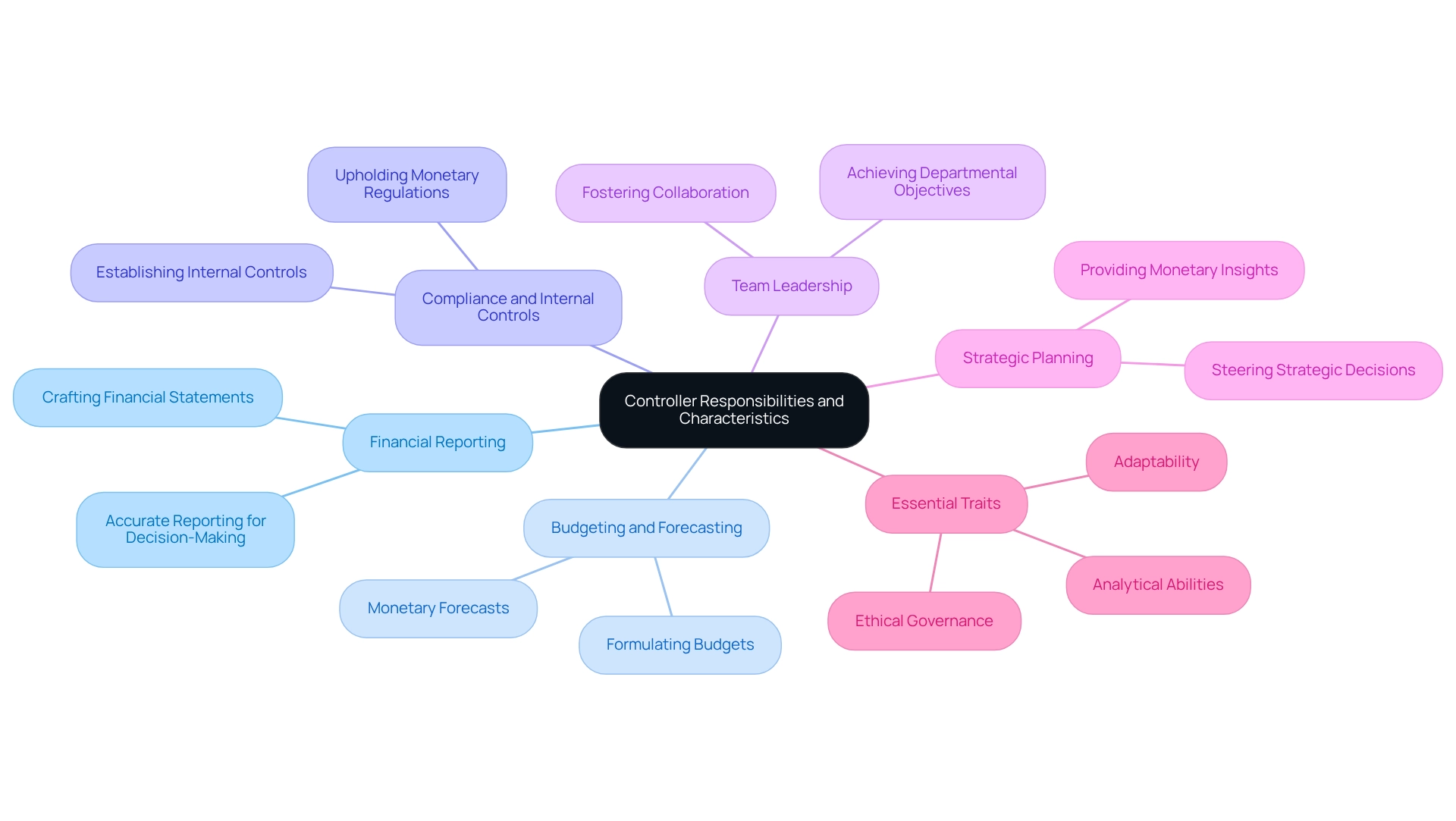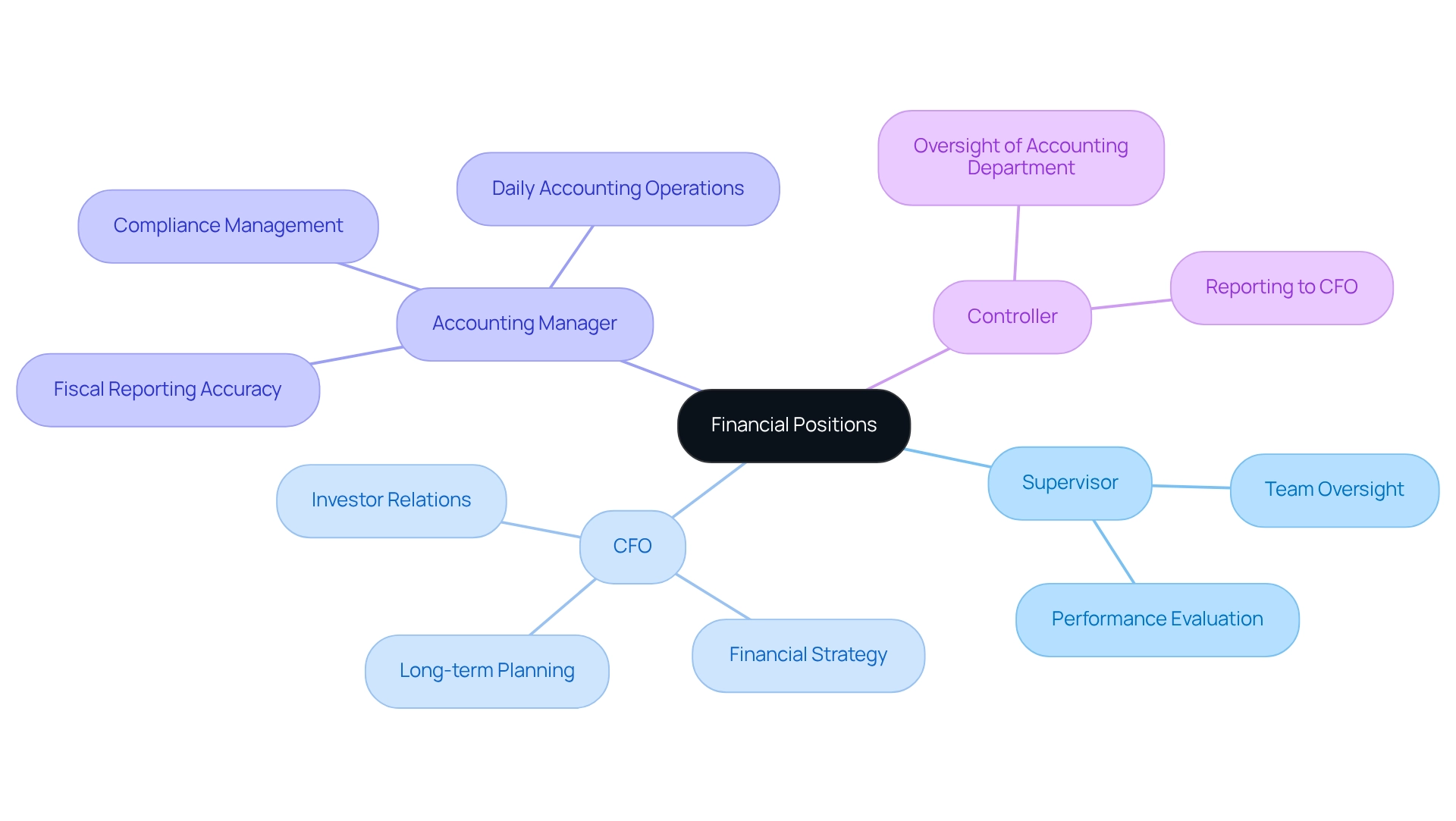Overview
The controller job title in finance signifies a senior executive tasked with managing accounting operations, ensuring financial accuracy, compliance, and strategic decision-making. Controllers have evolved into vital contributors to corporate governance and strategy. Their roles now encompass:
- Budgeting
- Internal controls
- Ethical oversight
This reflects an increasing importance in navigating complex financial landscapes. This evolution raises critical questions:
- How can organizations leverage the expertise of controllers to enhance their financial strategies?
- By recognizing the multifaceted responsibilities of controllers, companies can better appreciate their role in fostering sustainable growth and compliance.
Key Highlights:
- The controller, or fiscal controller, is a senior executive managing accounting operations, including reporting, compliance, budgeting, and internal controls.
- Controllers ensure financial statement accuracy and regulatory adherence, playing a critical role in corporate governance and strategic decision-making.
- In 2025, finance managers in the U.S. earn an average of over $120,000, reflecting their importance in navigating ethical fiscal responsibilities.
- The role of budget managers has expanded, with a noted increase in demand by over 30% in the past decade, emphasizing their strategic contributions.
- Controllers are evolving into ‘value articulators,’ participating actively in corporate strategy and investment decisions.
- Key responsibilities of controllers include financial reporting, budgeting, compliance, team leadership, and strategic planning.
- Essential traits for effective controllers include adaptability, ethical governance, analytical skills, and clear communication.
- Controllers differ from other financial roles: accounting managers focus on reporting accuracy, while CFOs oversee broader financial strategy.
Introduction
In the intricate world of finance, the role of the controller emerges as a cornerstone of organizational integrity and strategic insight. Controllers are tasked with overseeing accounting operations, ensuring that financial reporting is not only accurate but also compliant with ever-evolving regulations. As they navigate the complexities of budgeting, internal controls, and ethical governance, these professionals have evolved from mere number crunchers into vital players in corporate strategy.
With the demand for their expertise surging, understanding the multifaceted responsibilities and unique position of controllers is essential for both organizations and aspiring finance professionals. This exploration delves into the historical evolution, key functions, and distinguishing characteristics of financial controllers, highlighting their indispensable role in shaping the financial landscape of modern businesses.
Defining the Controller Job Title in Finance
The controller job title, often referred to as the fiscal controller, is a senior-level executive responsible for managing an organization’s accounting operations. This critical position encompasses a wide array of responsibilities, including reporting, compliance, budgeting, and the establishment of internal controls. Controllers play an essential role in ensuring the accuracy of financial statements and adherence to regulatory standards, thereby safeguarding the economic health of the company. Typically reporting to the Chief Financial Officer (CFO), they contribute significantly to strategic decision-making by providing insights derived from financial data.
In 2025, the average income for finance managers in the U.S. underscores their vital importance, with compensation packages often exceeding $120,000 per year, contingent upon the organization’s size and complexity. This financial commitment highlights the value placed on managers, who not only manage figures but also navigate the ethical dimensions of fiscal responsibility. As Amanda Green aptly notes, “CPAs don’t just handle numbers; they traverse the ethical terrains of fiscal responsibility.” This statement emphasizes that accountability transcends mere accounting; it is a guiding principle that informs managers’ decision-making processes.
The role of budget managers has evolved, particularly in light of recent advancements in corporate governance. They are increasingly acknowledged for their contributions to accountability and ethical standards within organizations. A notable case study features Dicken, the budget manager of Good Men Investment Co. Ltd., who faced a moral dilemma related to insider trading. This scenario underscores the imperative for managers to adhere to ethical guidelines and the potential consequences of misusing confidential information, reinforcing their role in upholding corporate governance.
As organizations navigate complex economic landscapes, the importance of fiscal managers in corporate governance becomes ever more apparent. Their ability to ensure compliance and provide strategic insights positions them as invaluable assets within any financial team, ultimately influencing both the organization’s success and the individuals within it.
Historical Context and Importance of the Controller Role
The function of the manager has its roots in the early accounting methods of the 15th century, primarily centered on record-keeping and reporting. As businesses expanded and regulatory demands intensified, the financial manager’s responsibilities evolved into a more strategic role. Today, managers are tasked not only with maintaining accurate accounting records but also with delivering strategic insights that inform organizational decision-making. This shift has become increasingly crucial in recent years, as companies navigate heightened scrutiny regarding transparency and compliance with regulations such as Sarbanes-Oxley. Contemporary fiscal managers are instrumental in driving growth, mitigating risks, and overseeing monetary operations, underscoring their significance in the current business landscape.
Recent statistics reveal that the demand for budget managers has surged by over 30% in the past decade, emphasizing their growing importance within organizations. Furthermore, Boutique Recruiting’s commitment to providing specialized recruitment services for accounting roles illustrates how effective hiring strategies can significantly impact the recruitment of qualified finance managers. Their customized approach to tackling talent acquisition challenges highlights the necessity of cultivating relationships that lead to sustained success in attracting top talent. The evolution of the controller job title mirrors a broader trend in finance, where individuals in this role are increasingly recognized as pivotal players in shaping business strategy and fostering innovation.
Key Responsibilities and Characteristics of a Controller
The controller job title is assigned a varied range of vital duties that are crucial for the economic well-being of a company. These include:
- Financial Reporting: Crafting precise financial statements and reports that accurately depict the company’s financial position, which is vital for informed decision-making.
- Budgeting and Forecasting: Formulating budgets and monetary forecasts that serve as a roadmap for the organization’s economic strategy, ensuring alignment with long-term goals.
- Compliance and Internal Controls: Upholding monetary regulations and establishing robust internal controls to protect organizational assets and maintain integrity in reporting.
- Team Leadership: Leading the accounting team by fostering a collaborative and productive environment, which is crucial for achieving departmental objectives.
- Strategic Planning: Providing monetary insights that steer strategic business decisions, thereby positioning the manager as a vital ally in corporate strategy discussions.
In 2025, the function of budget managers is increasingly defined by their strategic participation in corporate decisions. They are not just traditional accountants; they have evolved into ‘value articulators,’ as noted by industry leaders. This transformation is exemplified by a corporate financial manager, holding the controller job title, of a US$25 billion energy company who is initiating a finance transformation, highlighting the trend of financial leaders taking on more strategic roles in large organizations. Statistics show that managers dedicate an average of 30% of their time to reporting on finances. This highlights the significance of efficiency in this domain. Furthermore, case studies demonstrate that managers who participate in strategic business involvement significantly enhance their influence on investment strategies and risk management. For example, the case study named ‘Strategic Involvement in Corporate Decisions’ illustrates how budget managers are increasingly engaged in directing investment strategies, thus reinforcing their position as essential allies in promoting organizational growth.
Essential traits of efficient managers include adaptability, ethical governance, and a commitment to value realization. These characteristics are progressively sought after in today’s evolving economic environment. This emphasizes the need for managers to have robust analytical abilities, careful attention to detail, and the capability to communicate intricate economic information efficiently to stakeholders.
Distinguishing the Controller from Other Financial Positions
In the realm of financial management, the supervisor, CFO, and accounting manager each occupy pivotal roles, yet their responsibilities diverge significantly.
- The accounting manager primarily focuses on the accuracy of fiscal reporting and compliance, acting as the leader of the accounting department.
- Conversely, the CFO oversees the broader financial strategy of the organization, encompassing long-term financial planning and investor relations.
- Meanwhile, the accounting manager, under the controller job title, is responsible for the daily accounting operations and reports directly to the controller.
Recognizing these distinctions is essential for organizations aiming to cultivate effective finance teams and for candidates seeking to elevate their careers in the finance sector.
Conclusion
The role of the financial controller has evolved into a cornerstone of organizational integrity and strategic insight, encompassing a wide range of responsibilities from financial reporting to ethical governance. As businesses face increasing scrutiny and regulatory demands, controllers ensure compliance while delivering critical financial insights that inform strategic decision-making. Their ability to craft accurate financial statements and establish robust internal controls not only safeguards the financial health of the organization but also positions them as vital players in shaping corporate strategy.
Historically rooted in early accounting practices, the controller’s role has transformed significantly, reflecting the changing landscape of finance. The demand for skilled controllers has surged, highlighting their importance in driving growth and mitigating risks. As evidenced by the evolving nature of their responsibilities, controllers are now recognized as key contributors to innovation and strategic planning within organizations. Their unique position allows them to influence investment strategies and enhance overall financial health, reinforcing their status as indispensable members of the financial team.
Ultimately, understanding the multifaceted responsibilities and distinguishing characteristics of financial controllers is essential for both organizations and aspiring finance professionals. As they navigate complex financial landscapes, controllers embody the principles of accountability and ethical governance, ensuring that the financial integrity of businesses is maintained. Their strategic involvement is not just a trend; it is a necessity for organizations aiming to thrive in today’s competitive environment. Embracing the evolution of the controller role is crucial for fostering effective finance teams that can adapt to the demands of the modern business world.
In conclusion, organizations must recognize the pivotal role that financial controllers play in shaping their future. Are you ready to leverage their expertise to enhance your financial strategies? Connect with us today to explore how our personalized recruitment services can help you find the right talent to drive your business forward.
Frequently Asked Questions
What is the role of a controller in an organization?
The controller, often referred to as the fiscal controller, is a senior-level executive responsible for managing an organization’s accounting operations, including reporting, compliance, budgeting, and establishing internal controls.
How does a controller contribute to strategic decision-making?
Controllers provide insights derived from financial data, which significantly contribute to strategic decision-making within the organization.
What is the average income for finance managers in the U.S. as of 2025?
The average income for finance managers in the U.S. in 2025 is expected to exceed $120,000 per year, depending on the organization’s size and complexity.
What ethical responsibilities do controllers have?
Controllers navigate the ethical dimensions of fiscal responsibility, ensuring accountability and adherence to ethical guidelines in their decision-making processes.
Can you provide an example of a budget manager facing an ethical dilemma?
A notable case study involves Dicken, the budget manager of Good Men Investment Co. Ltd., who faced a moral dilemma related to insider trading, highlighting the importance of adhering to ethical guidelines.
Why is the role of fiscal managers important in corporate governance?
Fiscal managers ensure compliance with regulatory standards and provide strategic insights, making them invaluable assets in navigating complex economic landscapes and influencing organizational success.






